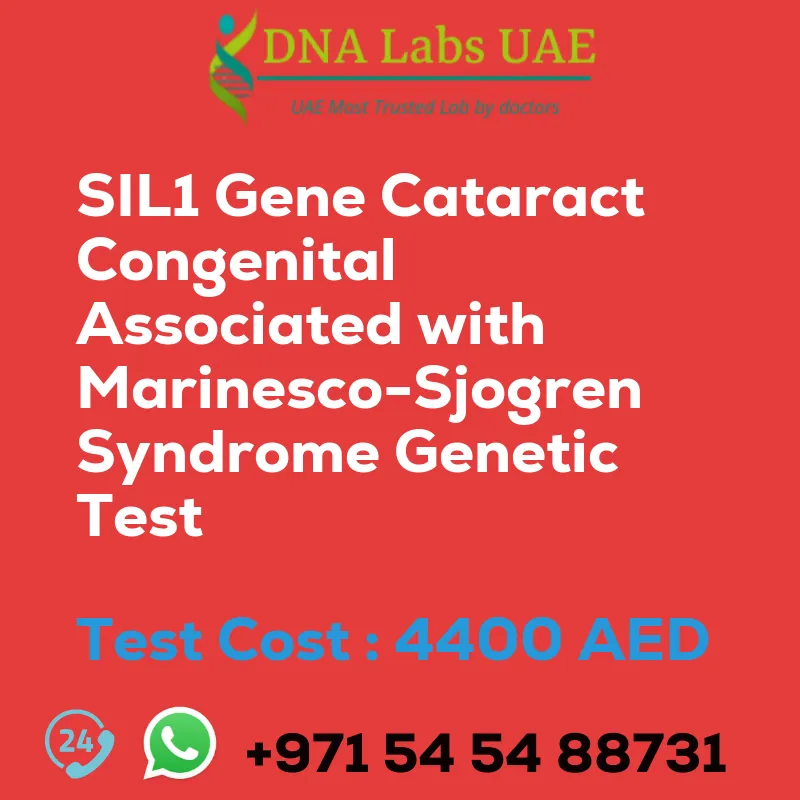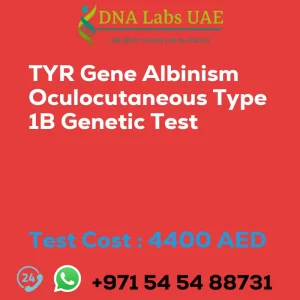SIL1 Gene Cataract congenital associated with Marinesco-Sjogren Syndrome Genetic Test
Welcome to DNA Labs UAE, where we offer the SIL1 Gene Cataract congenital associated with Marinesco-Sjogren Syndrome Genetic Test. This test is designed to help diagnose and manage Marinesco-Sjogren Syndrome (MSS), a rare autosomal recessive disorder characterized by congenital cataracts, cerebellar ataxia, muscle weakness, and delayed motor development.
Test Details
The SIL1 gene is associated with Marinesco-Sjogren Syndrome (MSS). It provides instructions for making a protein called SIL1, which plays a crucial role in the proper folding and assembly of other proteins in the endoplasmic reticulum (ER) of cells. Mutations in the SIL1 gene can disrupt the normal function of the SIL1 protein, leading to the accumulation of misfolded proteins in the ER and subsequent ER stress. This can ultimately result in the death of cells, particularly those in the cerebellum and lens of the eye, causing the characteristic symptoms of MSS.
Test Components
- Price: 4400.0 AED
- Sample Condition: Blood or Extracted DNA or One drop Blood on FTA Card
- Report Delivery: 3 to 4 Weeks
- Method: NGS Technology
- Test Type: Ophthalmology Disorders
- Doctor: Ophthalmologist
- Test Department: Genetics
Pre Test Information
Prior to undergoing the SIL1 Gene Cataract congenital associated with Marinesco-Sjogren Syndrome Genetic Test, it is important to provide the clinical history of the patient. Additionally, a genetic counseling session may be conducted to draw a pedigree chart of family members affected with SIL1 Gene Cataract congenital associated with Marinesco-Sjogren Syndrome NGS Genetic DNA Test gene SIL1.
How the Test Works
NGS genetic testing is used to identify mutations in the SIL1 gene that are associated with MSS. This testing involves sequencing the DNA of an individual to identify any changes or variations in the SIL1 gene that may be contributing to the development of the disorder. By identifying these mutations, the test can assist with diagnosis, genetic counseling, and management of the condition.
At DNA Labs UAE, we strive to provide accurate and reliable genetic testing services. If you suspect Marinesco-Sjogren Syndrome or have a family history of the disorder, our SIL1 Gene Cataract congenital associated with Marinesco-Sjogren Syndrome Genetic Test can provide valuable insights for you and your healthcare provider. Contact us today to learn more or schedule an appointment.
| Test Name | SIL1 Gene Cataract congenital associated with Marinesco-Sjogren Syndrome Genetic Test |
|---|---|
| Components | |
| Price | 4400.0 AED |
| Sample Condition | Blood or Extracted DNA or One drop Blood on FTA Card |
| Report Delivery | 3 to 4 Weeks |
| Method | NGS Technology |
| Test type | Ophthalmology Disorders |
| Doctor | Ophthalmologist |
| Test Department: | Genetics |
| Pre Test Information | Clinical History of Patient who is going for SIL1 Gene Cataract, congenital, associated with Marinesco-Sjogren Syndrome NGS Genetic DNA Test. A Genetic Counselling session to draw a pedigree chart of family members affected with SIL1 Gene Cataract, congenital, associated with Marinesco-Sjogren Syndrome NGS Genetic DNA Test gene SIL1 |
| Test Details |
The SIL1 gene is associated with Marinesco-Sjogren Syndrome (MSS), which is a rare autosomal recessive disorder characterized by congenital cataracts, cerebellar ataxia, muscle weakness, and delayed motor development. The SIL1 gene provides instructions for making a protein called SIL1, which is involved in the proper folding and assembly of other proteins in the endoplasmic reticulum (ER) of cells. Mutations in the SIL1 gene can disrupt the normal function of the SIL1 protein, leading to the accumulation of misfolded proteins in the ER and subsequent ER stress. This can ultimately result in the death of cells, particularly those in the cerebellum and lens of the eye, leading to the characteristic symptoms of MSS. NGS genetic testing can be used to identify mutations in the SIL1 gene that are associated with MSS. This testing involves sequencing the DNA of an individual to identify any changes or variations in the SIL1 gene that may be contributing to the development of the disorder. Identification of these mutations can help with diagnosis, genetic counseling, and management of the condition. |








